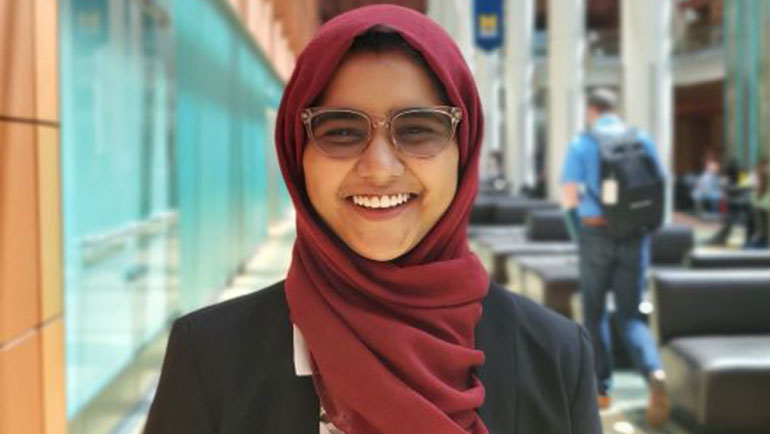
DETROIT — Tazia Miah is a research technician at the Michigan Developmental Disabilities Institute (MI-DDI) at Wayne State University and a current graduate student at Wayne State’s School of Medicine. She was recently recognized by the Michigan Public Health Institute (MPHI) for her support of their Anti-Oppression Leadership Team (AOLT) Executive Committee and for fostering anti-oppression initiatives within the Office for Anti-Oppression Strategy and Internal Solutions (OASIS) partnerships.
MPHI is composed of process and content experts with a shared mission of working together to center equity, promote health and advance well-being within Michigan. It collaborates with academic, government, health care and community-based organizations to develop solutions that address critical public health needs.
The AOLT, established in 2021, consists of key staff members from every leadership level within the institute. Its goal is to integrate anti-oppression values into every part of MPHI’s organization and culture, highlighting the voices of those most affected by oppression to create a workplace where everyone can work freely and achieve their full potential.
Miah joined MPHI in February 2024 through OASIS's public health fellowship program, which was created to build a diverse group of professionals at the organization. Participants work to develop an anti-oppression and equity approach that MPHI uses as the foundation for its strategies and goals. Examples of fellows’ responsibilities include assisting in administrative tasks, supporting educational and awareness initiatives, researching best practices, and facilitating the operationalization of anti-oppression goals.
“My motivation for public health stems from its impact on our daily lives, the multitude of identities it touches and its role in shaping history. When collaborating within public health systems, I am inspired by the chance to understand the human connection in our diverse communities,” said Miah.
Some of the Miah’s collaborations include developing the institute's Affinity Group Model Framework, leading internal feedback and project development meetings for OASIS, conducting literature reviews and environmental scans of best practices, and helping assemble the Staff of Color Affinity Group’s internal newsletter for AAPI Heritage Month. She is currently developing a tool that captures the process of capacity-building and relational partnerships in internal anti-oppression initiatives and health equity work.
Miah received her bachelor of science in international studies: global environment and health from the University of Michigan and is currently completing her master of science in basic medical science at the Wayne State University School of Medicine. Since joining MI-DDI in 2020, she has supported local and statewide efforts to create more inclusive communities and improve the quality of life for people with disabilities and their families. As a research technician, one of the projects Miah contributes to is the National Core Indicators Research Project, which tracks how well Michigan's services for people with disabilities are performing compared to national standards. Her responsibilities include coordinating the project, analyzing data and conducting interviews.
MPHI primarily operates in Michigan but has staff members across the nation composed of more than 1,000 individuals including researchers, data analysts, evaluators and scientists who are trained in a broad array of health fields and have extensive experience in community-based work.
About MI-DDI
MI-DDI’s mission is to contribute to the development of inclusive communities and quality of life for people with disabilities and their families. This is done through a culturally sensitive statewide program of training and education, community support and services, research, and information development and sharing.
Learn more at ddi.wayne.edu.
